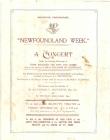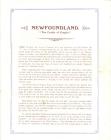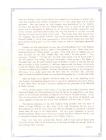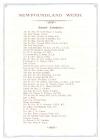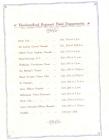1
Newfoundland Week - In Britain, during the summer of 1917, several institutions in London came up with the idea of making the 420th anniversary of John Cabot's discovery of Newfoundland an occasion to pay tribute to the heroism of Newfoundland's soldiers. Six organizations joined in sponsoring Newfoundland Week: the Royal Colonial Institute, the British Empire League, the Victoria League, the British Empire Club, the Overseas Club and the Newfoundland War Contingent Association.The organization had trouble finding Newfoundland soldiers to participate as the 1st Battalion was fighting in Flanders, the 2nd Reserve Battalion was training in Scotland, and the only Newfoundland soldiers in London were those recovering in military hospitals such as Wandsworth.
Fortunately, the Regimental Band was available and arrangements were made for it to visit London. The band had a full week with at least two concerts a day. Wherever the band went in London it was accompanied by the Regimental mascot, the Newfoundland dog Sable Chief, led by Pte. Hazen Fraser.
(Source: The Fighting Newfoundlander by Colonel G. W. L. Nicholson).
-------------------------------------------------------------------
The follwing pictures show the official souvenir programme that was used for Newfoundand Week and the text on these pages has been transcribed and attached.
After the pictures of the souvenir programme there follows some pictures of the Regimental Band playing at some of the sites in London during Newfoundland Week.
-------------------------------------------------------------------
The cover of the Souvenir Programme for Newfoundland Week reads as follows:
"NEWFOUNDLAND WEEK"
A CONCERT
Under the Gracious Patronage of THEIR MAJESTIES THE KING AND QUEEN and in the presence of H.R.H. THE DUKE OF CONNAUGHT
-------------------------------------------------------------------
The Band of the 1st NEWFOUNDLAND REGIMENT will perform.
(Conducted by Bandmaster L. L. WORTHINGTON)
The Orchestra of His Majesty's Theatre under the direction of Mr. PERCY FLETCHER
-------------------------------------------------------------------
The Concert under the direction of
Sir ALEXANDER C. MACKENZIE, Mus. Doc.
and
Sir THOMAS BEECHAM, Bart.
-------------------------------------------------------------------
To be held at HIS MAJESTY'S THEATRE on
TUESDAY, SEPTEMBER 25th, 1917, at 2:30 pm
(by kind permission of the Joint Management)
-------------------------------------------------------------------
In Aid of the PRISONERS OF WAR FUND of the
JOINT WAR COMMITTEE of the BRITISH RED CROSS
SOCIETY and the ORDER OF ST. JOHN.
4
NEWFOUNDLAND"The Cradle of Empire"
"The Antient and Loyale Colony," as it was termed in the old Charters, the first of England's overseas adventures, the last link of England with the New World during the failures of the Elizabethan period, and the germ [gem] of our Majestic Empire of today, was discovered by John Cabot in 1497. It was in a Bristol ship, well set up and furnished forth by Bristol Merchants, manned by men of the West Country and under Royal patronage of Henry VII, given for a consideration of a tithe of the profits, that Cabot sailed from Bristol on his voyage of discovery to rival the discoveries of Christopher Columbus and Vasco de Gama, and incidentally to uphold England's prestige as a Maritime Power.
Cabot returned safely with wondrous stories of seas stiff with fishes and marine monsters, and the following year sailed again with five other vessels fitted out for the fisheries by the merchants of Bristol and London. Europe had hitherto depended upon the Iceland and North Sea Fisheries for salt cod - a staple food in those days for victualling ships and ships and armies, and moreover a necessity of life through the Pope's spiritual and temporal sway.
The fishing fleets of France, Spain and Portugal soon followed the English lead, and made yearly voyages to the banks, bays and estuaries, gathering the boundless harvest of its green seas, roaming farther North into the Gulf of St. Lawrence, and later on along the coasts of Labrador. The foreign name for the new fisheries was Baccaloas, "The Land of Cod," so that unlike many travellers' tales and after him, those of John Cabot were fully justified by facts, and remain so until this day.
King Henry gave "to hym that founde the new isle" 10, and afterwards added a pension of 20 a year, to be paid from the revenues of the Town of Bristol. From these humble beginnings were laid the foundations of our mighty Overseas Empire on which, by God's Grace, and the steadfast loyalty of the British race to their ideals of right and justice, the Sun will never set.
In 1583 Sir Humphrey Gilbert took formal possession of the Island with 200 leagues of both sea and land surrounding it, in the name of his "most gracious Lady, Queen Elizabeth." In 1610 a settlement was made on the land by Alderman Guy, of Bristol, and 52 hardy adventurers of the West Country. Until that date the community might be classed as amphibious, with their ships at sea and their drying shacks or sheds on
6
land, and although some of each fishing fleet wintered on the shores, to protect their stores and buildings from Indians and pirates of their own colour, there was no actual settlement. Law and Justice on both elements were administered by the Admiral-Governor, the Captain of the first British fishing vessel to arrive in the port each season, and the assumption of authority by an Alderman-Governor, caused the usual friction between land-livers and sea-going men that has existed for all time since the first dug out canoe was launched in the world. The foreign fleets also elected their own Admirals, but the British Admiral ruled over all, especially after the defeat of the Spanish Armada in which great engagement the Newfoundland fishing shops bore their part manfully, having given up their yearly voyage to help in "singeing the Spaniard's beard."Virginia was first settled about the same date as Newfoundland, 1610; New England in 1614; and the Pilgrim Fathers landed in Massachusets in 1620. When these latter asked permission of "Prince James" to return from their exile in Holland and sail from Plymouth for the New World, they were asked "To what profit?" They answered, "Fishing!" "So God have my soul," quoth James, "tis an honest trade, it was the Apostles' own calling," and gave his consent. Then, as now, "The Banks of Newfoundland" was the great meeting place of Nations in search of fish, but bait was only procurable in large quantities in shallower waters round the shores of the island, so that the Colonists had a monopoly of that trade, with the result that its little community was soon recruited by other Britons - Puritans, Roundheads, and later on the Covenanters, with many more sturdy assets that left their home for conscience sake, and from these elements descended a British race that feared God greatly, but very little else in life.
After the defeat of the Spanish Armada in 1588, and on to the beginning of the 19th Century, Newfoundland played its part in most of the fighting by sea, and in defence of their Island Home by land, in the great quarrels for the possession of the Mainland of North America.
To the steadfast loyalty of this offshoot of our race, we owe what is left of our North American Colonies, for Newfoundland has been the key to the great Rivers and Lakes system of the Northern Continent as England is to those of Western Europe. In the War of Independence also, Newfoundland was loyal to the Crown of England, and fought gallantly and sea around their Homeland until the treaty of Ghent.
The glorious Dominion of the 16th Century which extended from the State of Maine to Cape Chidley, has been shorn its wide Territories, but the men of Newfoundland are still the same hardy race that has guarded the stronghold of British Power since the days of our Virgin Queen. Out of a gross population of 240,000, Newfoundland has offered 10,000 of her sons to stand shoulder to shoulder with the men of the great Overseas Dominions and of their Mother Country.
Once more they have answered the Nation's Call to Arms and are laying down their lives for the ideals of the British race in the front of Battle, by Sea and Land, in the Universal War of today.
H.F.R.
8
NEWFOUNDLAND WEEKGeneral Committee:
The Rt. Hon. the Lord Mayor of London.
The Earl of Brassey, G.C.B.
The Rt. Hon. the Earl of Derby, K.G.
The Rt. Hon. the Earl of Selborne, K.G.
The Rt. Hon. Viscount Harcourt
The Rt. Hon. Viscount Milner, G.C.B., G.C.M.G
The Lord Rothermere
The Lord Sydenham, G.C.S.I., G.C.M.G., G.C.I.E.
Admiral Sir Nathaniel Bowden-Smith, K.C.B.
Sir W. E. Davidson. K.C.M.G.
Lt. General Sir J.S.Ewart, K.C.B.
The Rt. Hon. Andrew Fisher
The Rt. Hon. Sir Eric Geddes, G.B.E., K.C.B.
Lt. Colonel A. L. Hadow, C.M.G
John Howard
Admiral Sir John Jellicoe, G.C.B., O. M., G.C.V.O.
Lieut. General Sir Francis Lloyd, K.C.B., C.V.O., D.S.O.
The Rt. Hon. Walter Long, M.P.
The Hon. Sir Peter McBride
The Hon. Sir Thos. Mackenzie, K.C.M.G.
The Hon. Sir John McCall, M.D.
Col. Sir Henry McCallum, G.C.M.G
The Rt. Hon. Sir William MacGregor, G.C.M.G., C.B., M.D.
Brig. General the Hon. Sir Newton Moore, K.C.M.G.
The Rt. Hon. Sir E. P. Morris, K.C.M.G.
Colonel the Hon. P. Pelletier
The Hon. Sir G. H. Perley, K.C.M.G
Major Sir Thomas B. Robinson, K.C.M.G.
The Rt. Hon. Sir George Reid, G.C.B., G.C.M.G., M.P.
John A. Reid
Lieut. Col. Richard Reid
Robert Rutherford
The Rt. Hon. W. P. Schreiner, C.M.G., K.C.
Sir Arthur Steel-Maitland, Bart., M. P.
F. W. Summer
The Hon. J. H. Turner
The Hon. Charles Gregory Wade, K.C.
Col. Sir Edward Ward, Bart. K.C.B., K.C.V.O.
Harrison Watson
Lt. Colonel C. W. Whitaker
The Hon. Fred W. Young
10
NEWFOUNDLAND WEEKUnder the Auspices of
The Royal Colonial Institute
The British Empire League
The Victoria League
The British Empire Club
The Overseas Club
The Newfoundland War Contingent Association
_____________________________
Organization Committee:
Major H. A. Timewell, (Chairman).
Sir Harry Wilson, K.C.M.G., (Royal Empire League).
Mr. C. Freeman - Murray, (British Empire League).
Mr. W. Herbert Daw, (British Empire Club).
Mr. R. F. Jones, (Over-Seas Club).
Sir Joseph Outerbridge, (Newfoundland War Contingent Association).
Mr. H. F. Reeve, C. M. G. (Newfoundland War Contingent Association).
Mr. E. R. Morris, (Newfoundland War Contingent Association).
Mr. M. M. Beeton, (Anglo-Newfoundland Development Co., Ltd.).
Capt. J. C. Karn. (2nd Batt. Newfoundland Regiment).
Capt. J. E. J. Fox, (2nd Batt. Newfoundland Regiment).
2nd Lieut. H. A. Anderson, (Hon. Secretary).
13
The Times - August 28th, 1917NEWFOUNDLAND
(Newfoundland, the oldest British Colony, has given a large proportion of her manhood to the Great Cause, and out of her small population has suffered comparatively heavy losses. The regiment has gained honour in France and Gallipoli, and the Newfoundland R.N.R. has played no small part at sea).
There lies a Land in the West and North
Whither the bravest men went forth,
And daunted not by fog or ice
They reached at last to a Paradise.
Full two thousand miles it lay
Washed by a sea of English grey.
And they named it Newfoundland at sight;
It's rather the Land of Heart's Delight!
Now after close five hundred years
You give us back with fearless eyes.
Dimm'd with glory but not with tears
The greatest gift that a Land can prize.
You give back all that there is to give,
The young who die so the Land may live,
Nor willed it otherwise.
Die? They were weary, God gave them rest.
Fall? They are raised for evermore!
Whether on Beaumont Hamel's crest
Or "Caribou Hill" by the Turkish shore,
Never their glory can fade or fall
Who have won the greatest Cross of all,
Nor ever their country dies!
Ah! Men must know you to understand,
Have seen the cliffs of your rugged land,
Have seen the mist come rolling down
The hills that guard the glistening town,
Have seen the schooners creeping in,
And smelt the homely smell within
The fishing port asleep,
And in the rivers flowing free
Through the spruce woods to the sea
Have known the pools at break of day
Where silver-coated salmon play,
And seen the tangled river's brink
Where caribou come down to drink,
And beavers build and creep.
All this is shared with those who fell.
It is the Land they loved so well.
For many a soldier lying low
In some French village - battle glow,
Sees before his blood is spent
The sunset over Heart's Content.
Many a sailor lost at sea
Sweeping a mined-in channel free,
Sees his schooner far away,
And sunrise in Conception Bay.
Aye, though they died on distant shores
They died for This! It's doubly yours!
And there is Pride and Comfort too
To know what they once loved and knew.
There lies a Land in the West and North
Whither the bravest men went forth,
And daunted not by fog or ice
They reached at last to a Paradise.
A Land to be won by those who durst,
No wonder the English chose it first,
And they named it Newfoundland at sight;
It's rather the Land of Heart's Delight!
P. E. GOLDSMITH
